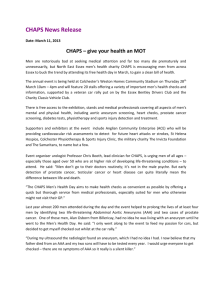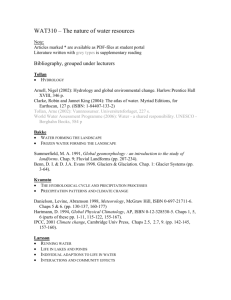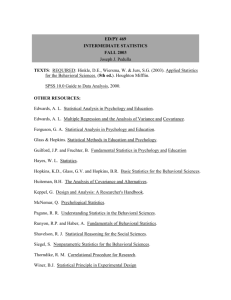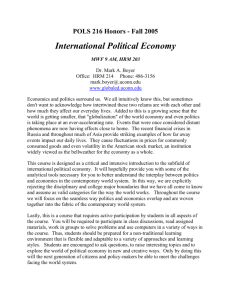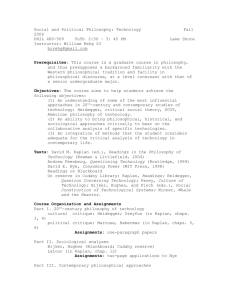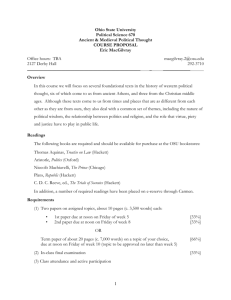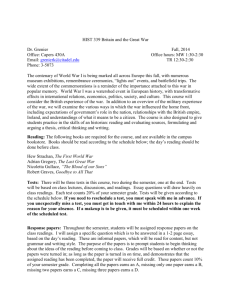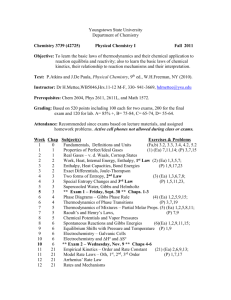Writing a Political Philosophy Essay
advertisement
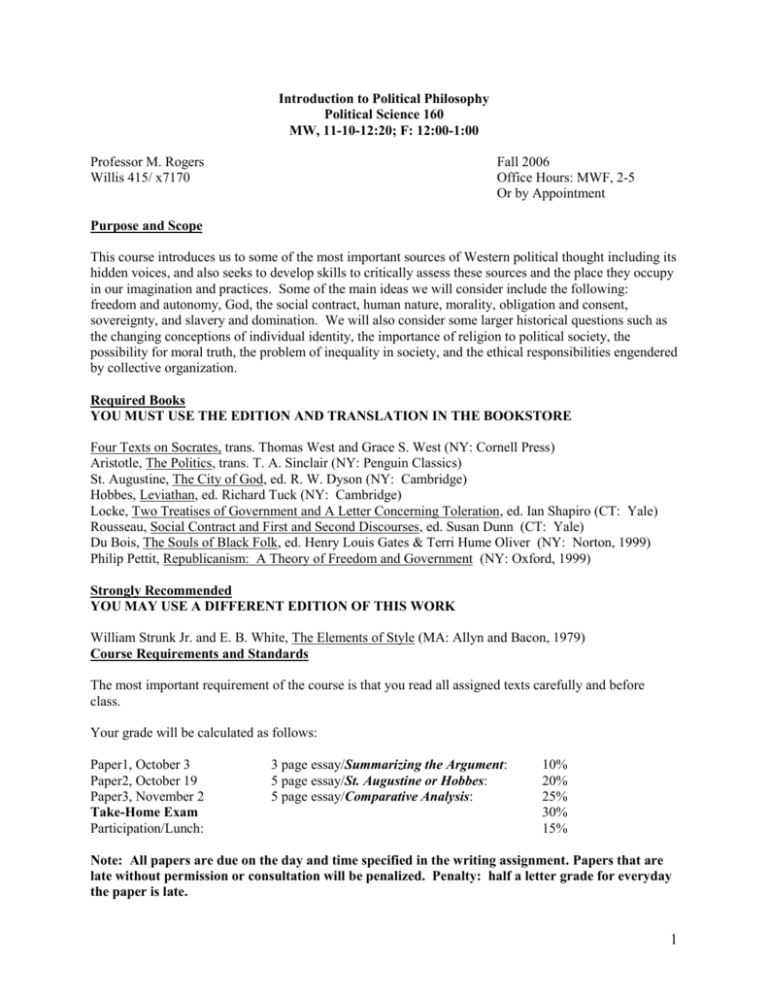
Introduction to Political Philosophy Political Science 160 MW, 11-10-12:20; F: 12:00-1:00 Professor M. Rogers Willis 415/ x7170 Fall 2006 Office Hours: MWF, 2-5 Or by Appointment Purpose and Scope This course introduces us to some of the most important sources of Western political thought including its hidden voices, and also seeks to develop skills to critically assess these sources and the place they occupy in our imagination and practices. Some of the main ideas we will consider include the following: freedom and autonomy, God, the social contract, human nature, morality, obligation and consent, sovereignty, and slavery and domination. We will also consider some larger historical questions such as the changing conceptions of individual identity, the importance of religion to political society, the possibility for moral truth, the problem of inequality in society, and the ethical responsibilities engendered by collective organization. Required Books YOU MUST USE THE EDITION AND TRANSLATION IN THE BOOKSTORE Four Texts on Socrates, trans. Thomas West and Grace S. West (NY: Cornell Press) Aristotle, The Politics, trans. T. A. Sinclair (NY: Penguin Classics) St. Augustine, The City of God, ed. R. W. Dyson (NY: Cambridge) Hobbes, Leviathan, ed. Richard Tuck (NY: Cambridge) Locke, Two Treatises of Government and A Letter Concerning Toleration, ed. Ian Shapiro (CT: Yale) Rousseau, Social Contract and First and Second Discourses, ed. Susan Dunn (CT: Yale) Du Bois, The Souls of Black Folk, ed. Henry Louis Gates & Terri Hume Oliver (NY: Norton, 1999) Philip Pettit, Republicanism: A Theory of Freedom and Government (NY: Oxford, 1999) Strongly Recommended YOU MAY USE A DIFFERENT EDITION OF THIS WORK William Strunk Jr. and E. B. White, The Elements of Style (MA: Allyn and Bacon, 1979) Course Requirements and Standards The most important requirement of the course is that you read all assigned texts carefully and before class. Your grade will be calculated as follows: Paper1, October 3 Paper2, October 19 Paper3, November 2 Take-Home Exam Participation/Lunch: 3 page essay/Summarizing the Argument: 5 page essay/St. Augustine or Hobbes: 5 page essay/Comparative Analysis: 10% 20% 25% 30% 15% Note: All papers are due on the day and time specified in the writing assignment. Papers that are late without permission or consultation will be penalized. Penalty: half a letter grade for everyday the paper is late. 1 Note: Participation refers to the frequency and thoughtfulness of your contributions to class and caucus discussion. Attendance alone does not count as participation. Disability Accommodations and Academic Honesty Any student who feels he or she may need an accommodation based on the impact of a disability should contact me privately to discuss specific needs. Please contact the Office of Disability Services for Students in the Wellness Center (x4464) to coordinate reasonable accommodations. “At Carleton College, an act of academic dishonesty is regarded as conflicting with the work and purpose of the entire College and not merely as a private matter between the student and an instructor; all cases involving such dishonesty are referred to the Academic Standing committee for appropriate action. This action can vary from a grade of Unsatisfactory in the given piece of work to a recommendation of permanent dismissal from the College in cases of repeated or serious offenses” (http://apps.carleton.edu/campus/doc/honesty/). Students are expected to be familiar with this statement and all related policies related to academic honesty at Carleton. Participation/In-Class and Caucus For Presenters Because the course will not be driven primarily by lectures, it is essential that you come prepared to ask questions and to move the discussion along. As such, students will be divided into groups of five. Each group will be responsible during the course for presenting on one of the reading assignments and for posting that presentation to Caucus for careful consideration by others. The purpose of the presentations is to provide us with an interpretation of the readings and leave us with questions that you would like for us to consider during our class meeting. The questions should be of such a nature that they require more than a yes or no response. As you think about constructing your presentations some of the questions that you might keep in mind include: What is the concern or problem to which the thinker seeks to respond? How does the thinker respond? To say it differently, what arguments does the thinker offer to address the concern or problem? In advancing the arguments, what assumptions are at work about human nature, human relationships, morality, God, the state, power, conflict, etc? Do the arguments logically cohere? To say it differently, are there contradictions in the argument that call into question its viability? Notice that this question is about internal coherence. Are there concerns external to the argument that were not considered, but which could have made a difference if taken into consideration? The presentations themselves will take place every Wednesday during class. This means that presentations should be posted to Caucus Tuesday night. Presenters should post no later than 11:00 pm. The group can designate a presenter or divide that responsibility. However, writing and crafting the presentation will be the responsibility of the group as a group. The exception to this rule applies to St. Augustine. In this case, students will post no later than 11:00 pm on Thursday night. 2 For Non-Presenters Your responsibility includes reading the presentations, crafting a short response to the presentations based on your own understanding of the text, and bringing both a copy of the presentation and your comments to class. Rationale for this Approach This approach is based on three considerations. First, political philosophers can be notoriously difficult to understand and comprehend. As we read, we need a running list of places of ambiguity, insights, and clues to what the author is attempting to say. Each text is an answer to questions and concerns of the highest order. As such, this running list is an attempt to figure out those questions, the answers, and assess the worth of both. Posting is an opportunity for you to do this and for us to figure out as a group what the texts are about. Second, the postings become cumulative wisdom that you can draw from as you write your papers. There should be markers in your postings to pages, passages, and links among pages that become a short-handed way for you to think through the text in a short amount of time without reading it again. (All of these texts, however, should be read again at some point.) Third, posting provides us with the opportunity to make our discussion dynamic and exciting. Nothing is more depressing then spending 30 minutes trying to figure out what you want to ask of each other and the text. So the postings will have generated a common point from which we can move. Reading Schedule September 11: Introduction (10:30-11:20) I. Classical and Christian Visions of Citizenship and Politics A. Social Criticism, Political Commitment and Conflict September 13: Plato, Apology of Socrates, entirety September 15: Plato, Crito, entirety (11:20-12:20) B. Conflict and the Possibility of Rational Resolution September 18: Aristotle, Politics, Book I, September 20: Aristotle, Politics, Book III, chaps 1-13 [Presentation] September 22: Aristotle, Politics, Book IV, chaps. 2-3, 8-9, 11-12, 15 C. Christian Realism and the Anguish of Life September 25: Review of Plato and Aristotle; Introducing Augustine September 27: St. Augustine, The City of God, Book I, Preface, chaps. 1-11, 15-16, 19, 29-36 September 29: St. Augustine, The City of God, Book XIX, chaps. 11-28 [Presentation; note that presenters will post on Thursday night no later than 11:00 pm] 3 II. Visions of Modernity A. Freedom as Non-Interference and the Avoidance of Conflict October 2: Hobbes, Leviathan, Author’s Introduction, chaps. 1, 4-7 October 4: Hobbes, Leviathan, chaps. 10-15 [Presentation] October 6: Hobbes, Leviathan, chaps. 17-19, 21, 26, 29 B. Liberalism, Freedom and Religious Toleration October 9: Locke, Second Treatise, chaps. 1-6 October 11: Locke, Second Treatise, chaps. 7-11 [Presentation] October 13: Locke, Second Treatise, chaps. 12-15, 19 October 18: Locke, Letter on Toleration, entirety [Presentation] C. Modern Anguish and Romanticism October 20: Rousseau, Second Discourses, pages 72-113 (Pay attention to endnotes which run from 139-48) October 23: Rousseau, Second Discourses, pages, 113-38 (Pay attention to endnotes which run from 139-48) D. Fulfilling the Promise of Modernity: Democracy and Non-Domination October 25: Du Bois, The Soul of Black Folk, Forethought-chap. 2; October 27: Booker T. Washington, “Atlanta Exposition Address”; Du Bois, The Soul of Black Folk, chaps. 3-5 October 30: Du Bois, The Soul of Black Folk, chaps. 6-8 November 1: Du Bois, The Soul of Black Folk, chaps. 9-11 [Presentation] November 3: Du Bois, The Souls of Black Folk, chaps. 12-14 November 6: Pettit, Republicanism, Intro.-chap. 1 November 8: Pettit, Republicanism, chaps. 2-3 November 10: Pettit, Republicanism, chaps. 4-5 November 13: Pettit, Republicanism, chaps. 6-7 November 15 Review and Conclusion 4 Writing a Political Philosophy Essay For Essays 2 and 3 A. The Purpose of the Assignment For this course, you write political philosophy papers to develop a number of fundamental skills. They include the following: (1) the ability to comprehend, reconstruct, and analyze complex, and at times, elusive philosophical arguments that have political and ethical implications; (2) the ability to argue persuasively for your own views; and (3) the ability to articulate your thoughts in a clear, concise, and organized manner. I am not interested in research papers. Please do not survey the literature out there on the topic you decide to address. B. Adopting a Position You may believe that there are no right answers in political philosophy. I disagree, for while interpretation is a slow process of arriving at conclusions about a thinker’s work, we are not precluded from believing that some interpretations are better than others. What makes some interpretations better than others has to do with the relationship that obtains between the argument being made by your essay and its connection to the internal dynamics of the texts under consideration, the historical milieu in which the text was written, and (dare I say) the biographical information of the thinker. The strength of this relationship, I believe, moves us closer to what is accurately going on within the text. Having said that you should feel comfortable adopting positions that challenge conclusions we have drawn during class sessions or on-line postings. For purposes of evaluations, I am concerned to see how your argument is executed and textually based. As such, writing abilities (e.g. proper use of grammar and punctuation, and careful, yet lively construction of prose) will be assessed alongside your explication of the text under consideration. 1 C. Format and General Pointers Please use 12point font, 1in margins, and double space the essay throughout. Please use in-text citations that provide author and pages in parentheses. For example: To be sure, Hobbes points out that it is competition for goods that “first, maketh men invade for Gain” (Hobbes, 88). If you quote more than four typed lines, the quotation should be distinguished from the rest of the text by indenting 1in from the left margin, without quotation marks, and singled space like so: When a man reckons without the use of words, which may be done in particular things, (as when upon the sight of any one thing, wee conjecture what was likely to have preceded, or is likely to follow upon it) if that which he thought likely to follow, followes not; or that which he thought likely to have preceded it, hath not preceded it, this is called ERROR; to which even the most prudent men are subject. But when we Reason in Words of generall signification, and fall upon a generall inference which is false; though it be commonly called Error, it is indeed an ABSURDITY, or senseless Speech. For Error is but a deception, in presuming that somewhat is past, or to come; of which thought it were not past, or not to come; yet there was no impossibility discoverable. (Hobbes, 33-34)2 Writing is a difficult and frustrating process, but it can also yield great enjoyment when you have found a comfort zone. Of course, essays must be written in Standard English, but I encourage you to write at a 1 For more on sentence construction and principles of composition please consult William Strunk Jr. and E. B. White, The Elements of Style (Needham Heights, MA: Allyn and Bacon, 1979), chaps. I-II. 2 For more on using quotations please consult, Strunk and White, chap. III. 5 level that is most comfortable for you. Do not feel the need to employ some of the technical language of political philosophy that I may use in class. If for example the structure of a sentence gets too complex, I encourage you to reconsider it altogether. Do not delete it. Instead, try to figure out how to break it up or to restate the point in different terms. Our usual understanding of philosophy pushes our writing toward lofty formulations and initial pontifications. I encourage you to reject all of this as you begin your paper. Your introductory paragraph should state very clearly your argument and give indication of how you will substantiate your thesis. This will require you to stick closely to the text as the foundation for the claims you will develop throughout your essay. Spend time with those passages in the text under consideration that you believe aid the development of your arguments and those that seemingly undercut the claims you wish to advance. Do not ignore those “bad” passages, those moments where a thinker seemingly goes in the opposite direction of your argument. You must make sense of those “bad” passages as well. Part of the reason why you address these passages is to make the reader feel confident that despite inconsistencies or contradictions within the text under consideration, your argument nonetheless captures the general tenor of what the text does or does not say. In this regard you may want to write an outline. (To be honest, I never write outlines.) After each paragraph you write, you should read what you have written thus far. This will allow you to achieve consistency, smooth transitions, and coherence. In this regard, you will come across key words or phrases, such as, “state of nature,” “aristocracy,” “will,” “social contract,” “nature,” “authority,” “freedom,” “reason,” “democracy,” etc. Spend time with these words in the context of the writers under consideration and define them. Make sure to proofread the draft. In doing this, you want to check that each paragraph moves the reader forward along a path that develops your argument. Here you want to reevaluate the analyses you will have offered for this or that particular passage or claim. Do not assume that the passage does the work of explanation. I expect you to explain in your own words how a particular passage fits into the context of the argument. You want to think at every stage of the reevaluation what kinds of counter-arguments can be made and whether or not you have anticipated and addressed them. At this juncture you may need to take a break from the paper, perhaps a couple of hours or a day. This will give you some critical distance to better assess the paper. Once you feel comfortable at the end of the paper, you will need to proofread once more. Now you are checking for spelling or grammatical errors that may obstruct coherence or intelligibility. You won’t catch them all, but try to catch enough of them. Well, I guess I have said enough. Have fun! 6
